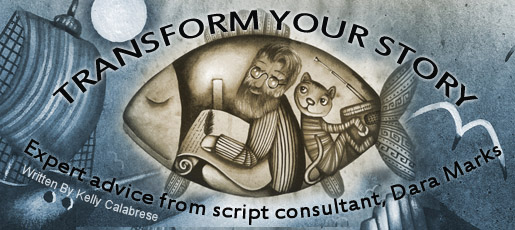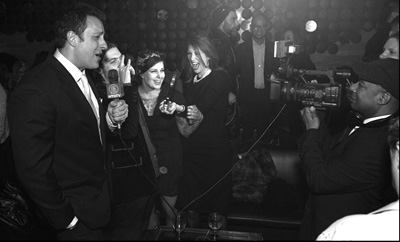Writers grab a pen and take note…
A focused emotional journey is vital for your story whether you are writing a script, a play or the next Great American Novel’ – and you CAN achieve this forward momentum through The Transformational Arc, developed by script consultant Dara Marks.
As a leading international script consultant, Dara Marks specializes in the analysis of the modern screenplay. Dara has over twenty years of experience and Creative Screenwriting Magazine consistently rates her as one of the top script consultants in the film industry with clients ranging from beginning and apprentice screenwriters to top studio writers and executives.
 In addition to script consulting, Dara Marks authored an exciting new book on screenwriting – INSIDE STORY: The Power of the Transformational Arc. www.daramarks.com/inside.php
In addition to script consulting, Dara Marks authored an exciting new book on screenwriting – INSIDE STORY: The Power of the Transformational Arc. www.daramarks.com/inside.php
To give NYCastings members a sneak peek into this innovative process, we spoke with Dara Marks about developing a powerful story…
According to Dara Marks… A strong transformational arc is the single most important element that makes the difference between a good screenplay and a great one.
When I became a script consultant a gazillion years ago, the state of the craft was basically looking at the Aristotle model of a beginning, middle and end, the three act structure, and that is an adequate way of looking at it because it is problem solving, Dara says. There is a problem, the problem gets exhausted and you find a resolution whether it is what you thought it was going to be or not. But I always look at things from an organic point of view – Is this what we as humans know to be true?
The problem for writers, I find, is that while the information about three act structures can be true and a literary goal that wants to be met to some degree, writers have the problem of – Where do you go to find this stuff? If that is not explored, it can feel like it is artificially imposed on the script; that at a certain point in the script, it needs a turning point. That is one of the biggest issues a writer faces. It is not that structure is not helpful and effective to use, the problem is that without a deep understanding it can feel uncreative. It can feel as if, you have to meet a certain goal, Dara shares.
The Transformational Arc is not the Dara Marks template to writing, it has to do with the organic arc that all human beings go through in order to process life.
All of us in life face conflict, disappointment, loss, and suffering. To me, at its basic core, I always refer to a story as the human instruction manual and I believe it is the truest power, Dara says
Scientists have said that the sexual process is enjoyable so human beings will procreate. I believe that stories are enjoyable so that human beings will psychologically procreate. We learn how to be human through our stories.
Imagine a world without story. Each of us would have to emotionally re-invent what it means to be human. We would have no model to follow. Embedded, or encoded, within a strong story that contains an emotional arc at its deepest level, is that we can process our problems in life, grow from it and become greater.
As a teacher, Dara Marks focuses on the idea, that there is no condition stasis in nature.
 Every living thing is either growing or evolving or has begun to decay and die, Dara says. That is part of what is encoded in the story. You are either going to face these problems and become greater for the experience or the problem itself will destroy you.
Every living thing is either growing or evolving or has begun to decay and die, Dara says. That is part of what is encoded in the story. You are either going to face these problems and become greater for the experience or the problem itself will destroy you.
I don’t mean from a heroic context that you have to defeat every villain. Failure to me is to stop trying. It is not encountering disappointments and things that diminish our efforts. It’s quitting.
Quitting is the failure of The Transformational Arc. It is not continuing to be present in life. That is the basis of where this work comes from.
Very often, a writer sits down to write but the story does not come out the way we intend. Dara Marks believes this is because creativity needs to be a three step process.
The first step begins intuitively; it is the only place the creativity springs from, Dara says. You are tapping into something that has never existed before in this world, in this form before, and that has to be the beginning of the process.
Step three is where this idea is expressed out to the world.
And to me, one of the reasons for failure is that we miss step two, which is where what we have intuited and brought in somewhat unconsciously, is never processed.
The reason why some writers do not achieve a strong emotional journey is because they need focus. The writer is, basically throwing unconscious matter out into the world.
A lot of times a writer will get a really good idea but nothing is ever substantially developed around that idea, Dara shares. It is one joke, or one concept, but no one ever investigates it. So, for me, step two is where the real work of writing is done. You write a first draft as quickly, as randomly as – What is hitting me? You want to follow any creative impulse you have and throw that down on that page, you don’t want to bypass that step. But then, you have to step back and look at it and try and understand what this is saying to you and through you.
I have to clarify here, Dara Marks says, that I do not mean that you psychoanalyze your material. You simply engage it. You explore what value is trying to express itself in the story.
Until the writer connects with that value the story will forever remain at the unconscious level, Dara shares.
I always say that as long as you continue to make unconscious choices you’re only going to continue to get random results.
So… How can YOU turn your unique idea into a solid story that will forever remain at the highest level of literary achievement?
Check Part Two of this article where Dara Marks helps writers face flaws and push through them.







